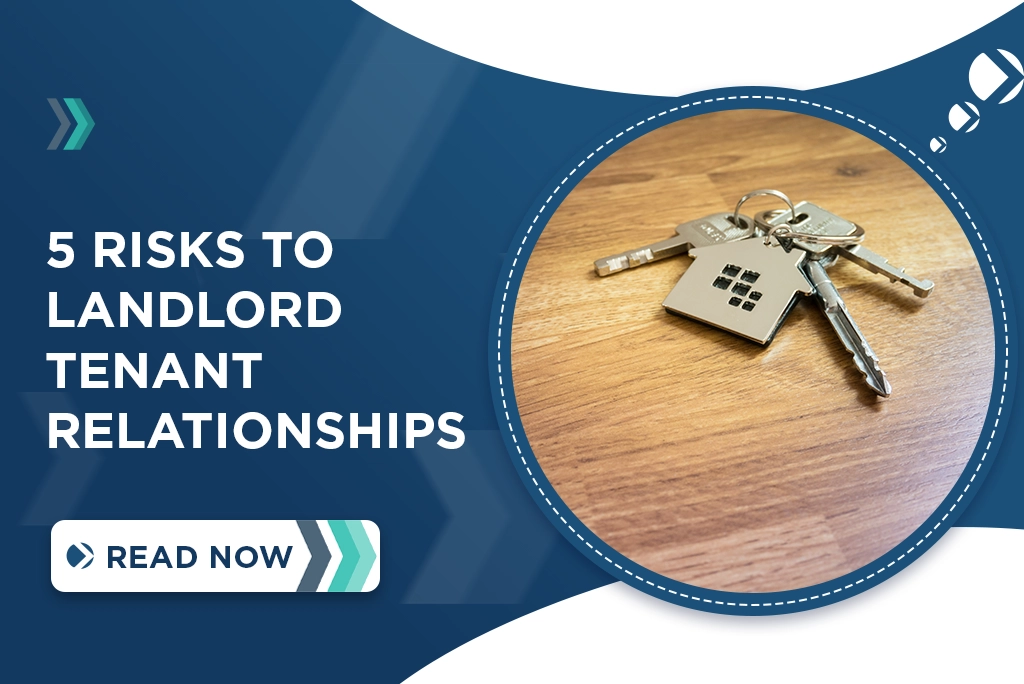
5 Risks To Landlord Tenant Relationships
2nd January 2021
A good landlord tenant relationship is extremely important. It helps make the period of the tenancy pleasant and easy for both parties and can also help to get recommendations from tenants in the future. However, no tenancy is completely problem-free. Here are 5 common problems that present risks to landlord-tenant relationships, and how to handle them.
1. Breakdown in Communication
Breakdowns in communication can happen on both sides, but it’s your responsibility to provide the best and clearest lines of communication to the tenant.
The best way to deal with this problem is through prevention. Put in place company policies to help you reply to tenants promptly, such as within 24 hours, and ensure that all your documentation is clear and legally correct.
When a tenant begins a tenancy, layout clearly the expectations on both sides of the agreement. This will help to minimise issues in the future. Be sure to give tenants space to ask any questions.
If you miss an email or text message, respond promptly when you realise and try to resolve the issue as quickly as possible. If a tenant is frequently bad at communicating with you, make it as easy as possible for them to respond to your messages, or perhaps try a different way of communicating.
If a breakdown in communication occurs, as a landlord, you should attempt to resolve this as smoothly as possible to keep the landlord-tenant relationship intact.
2. Unpaid Rent
No landlord wants to face the problem of unpaid rent, but if you’re responsible for a large number of properties or work with more high-risk tenants, then it is likely you will have to face this problem at some point.
Most landlords require tenants to set up a standing order, to minimise the risk of forgetting to make a payment. However, you might still experience problems with unpaid rent.
The first step is to politely request the payment. It’s possible the missed payment was completely accidental and can be quickly rectified. This is the ideal situation as it doesn’t present a threat to your landlord and tenant relationship.
If the payment isn’t paid, a second request should be sent that helps the tenant to understand the importance of the situation. Be clear on the consequences, but always ensure you are polite, respectful and professional. Ensuring professionalism helps to minimise the tenant feeling personally hurt or embarrassed, which ensures that your overall relationship and reputation remain intact.
Most landlords don’t want to risk harming their relationship with late-paying tenants by calling on a Debt Collection Agency to recover unpaid rent. However, using an ethical, professional debt recovery service can set expectations and stabilise this relationship, whilst providing certainty in the future that rent payments will be paid as agreed. Our landlord clients often tell us they wish they’d used our services sooner and saved themselves a lot of stress!

Large arrears
It doesn’t take many missed rent payments for arrears to stack up significantly. It’s an unfair position for a landlord to be put in. Often the fastest way to clear the debt and remove this burden is by using a Debt Collection Agency to recover what’s owed.
Legal Action
In a situation in which payment isn’t received after contacting the tenant, or if several months of payments are missing, it’s a good time to call in the experts. Many rent recovery agencies, such as DCBL, take into consideration your relationship with the tenant when conducting rent recovery work. A professional agency should work to ensure that your reputation is upheld.
Find out more about debt recovery services or commercial rent recovery from DCBL.
3. Mould
No one likes to live in a house with mould, and black mould can be a danger to the health of tenants. If a tenant reports mould, it’s important as a landlord to deal with this promptly.
However, mould can also be caused by a tenant’s activity within the house. For example, hanging clothing in poorly ventilated rooms or not keeping the house warm. To keep professional and to ensure your relationship with the tenant is secure, never blame the tenant for occurrences of mould, but do clearly communicate ways they can reduce the likelihood of problems.
4. Unexpected Problems
From burst pipes to burglary, unexpected problems affect both the tenants and the landlord. The first way to deal with this is to ensure you have insurance in place. Insurance means that when unexpected problems do occur you are financially equipped to deal with them promptly.
When the situation arises, it needs to be dealt with quickly. Be clear in your communication with the tenant about what you’re doing, how long it’s likely to take and if they need to do anything. Acting quickly is essential to maintain your relationship with the tenant when accidents happen.
5. Surprise Visits
Legally, landlords are required to give 24 hours’ notice if they need to visit the house for any reason. While the property belongs to you, it’s important to respect a tenant’s privacy and home by giving them notice of any visits. Make it clear why you need to visit and where possible, how long it is likely to take.
Being polite and respectful is key whenever you are communicating with a tenant. Using clear and effective communication goes a long way in helping to establish responsibilities and expectations, making for a much smoother ongoing relationship.
DCBL has worked with countless residential and commercial landlords to recover debt. We take into account your relationship with the tenant to deliver an exceptional level of service.






